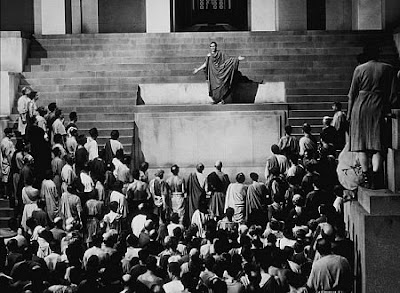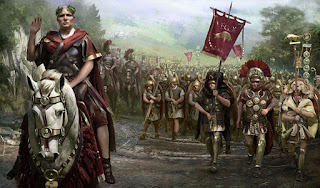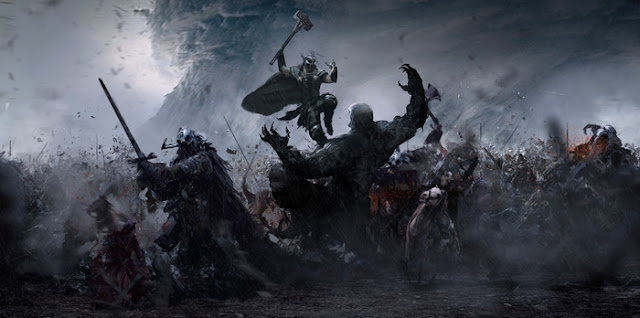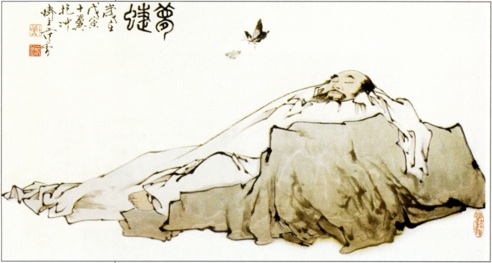 |
"Julius
Caesar, Act Three, Scene II" from William Shakespeare recounts of the aftermath of the murder of Julius Caesar. Accused of greediness and
dictatorship, he was killed by the Senat and by his trusted friend Brutus.
As Brutus delivered to the nation of the news, Antony, a friend of Caesar's
whom was ordered not to say any word going against the Senat's decision, commits to redeem
the honor of the fallen Julius Caesar by giving one of the most reknown
speechs in history. Between the lines and the hidden meanings of his words, he
succeeds to lead the crowd indirectly from supporting Caesar's killing to
rejecting it. This text stirs up several questions in my mind: Where does our
loyalty lie in the end: to our friends or to our homeland ? Does the final
outcome remain acceptable and honorable if we use the wrong methods to attain
it ? How is this story different from what we are living in our era ? Manipulation, Friendship and What is right from what is wrong are
key concepts to reflect on in this act.
 |
| Brutus, annoucing the death of Julius Caesar |
Manipluation starts with the speech Anthony gave to
the crowd. He, who is a genuine companion of Caesar, guarantees Caesar's spirit
that he would look for vengeance against the ones who betrayed him and he uses
an appropriate approach to do it. Antony's strategy in the burial service
address was an insightful stride by reporting the opposite of what he was
thinking. This strategy roll out the supporting natives the way they perceived
the story and were influenced by his rationality. The interesting thing is that
after all these years we can say that the history is repeating itself in real
scenes and by true actors called politicians; the same strategy with various
speeches and names in order to manipulate people's minds. Eventually we can say
that because of such rules and processes people do not trust neither policy nor
politicians for the unexpected flow of events that will occur seeing that
corruption is considered as a fundamental element of politics.
The degree of influence caused by manipulation varies
from one person to another of course. Some people are more inclined to change
their minds very quickly while others tend to need more arguments. But in the
end, what we choose to believe in is what becomes our reality and it is all defined by
our approach of the matter.
Julius Caesar once wrote down in his recollections of
the "De Bello Gallico" (Book III, Ch. 18) that men freely believe in
what they want ("Libenter homines id quod volunt credunt"). When
applied to the context, one may attribute the quote to Cassius', Brutus' and
Marc Antony's perspectives on the death of Caesar as throughout the
Shakespearean play the roles of each character unfold, revealing their point of
view. While all opinions are clearly and cleverly given during the speeches to
the crowds, a crucial aspect to take into consideration is the vulnerability of
the plebeians who switch their opinions from Brutus' speech to Marc Antony's
and question their loyalty to Caesar. This belief is clearly demonstrated in
Marc Antony's lines as he speaks:
"But yesterday the word of Caesar might
have stood against the world. Now lies he there, and none so poor to do him
reverence."
Indeed, within the lines the reader perceives the sense of
betrayal by the crowd whom minutes before had praised Brutus and Cassius and,
ironically enough, shifts again but in favor of Marc Antony. This passage alone
serves as a personal reminder to the once happy friendships ended due to either
one of the parties no longer being there or leaving the country, reinforcing
the idea that those who seem to revel in your presence might just be the first
to forget you once you've gone.
 |
| Julius Caesar's death. |
Thus, trusting fake friends can lead to digging our own
grave. Which is what happened to Caesar in the end. Being betrayed by people
whom he trusted did not favor him at all although one of the murders', Brutus, seemed
to be led by honorable reasons that is the survival of the homeland. Trusting
the allegations against Caesar, he made his final choice between his loyalty to
his friend and his loyalty to Rome by choosing to betray his compagnion in
favor of the country. We can see that Brutus committed a crime to prevent a
greater crime in his own perspective.
 |
| Julius Act 3, Scene 2: Marc Antony giving his speech |
« Had you rather Caesar were living and die all
slaves, than that Caesar were dead, to live all free men? »
Through this quote,
he is trying to transform a cold blood murder into a noble act he commited despite
his love and his respect for Ceasar in order to save rome. But a question
remains: can one person act as judge, jury and executioner? The first thought
that comes to my mind is the events the world is facing today. The war against
terrorism has become the major argument used by governments to justify the
transgressions towards citizens. Let’s take the example of The Guantanamo Bay
detention camp the United States military prison where hundreds of people have
been detained because they were suspected to be terrorists. No fair trials have
been conducted for most of them. Many detainees locked up in Guantanamo Bay
were innocent. They have been jailed and tortured for years with no proofs
against them only doubts. Current and former detainees have reported abuse and
torture. Some have seen their lives destroyed because of their religious
beliefs or because they lived in the war zone. Retired Colonel Lawrence B.
Wilkerson who worked under the Bush administration said that many detainees
have been arrested "without regard for whether they were truly enemy
combatants, or in fact whether many of them were enemies at all." William
Blackstone said once “Better that ten guilty persons escape than that one
innocent suffer.”
The question that comes to my mind is: Can good come out
of Evil ?
The reality of evils confronts us everyday. In our daily lives, we constantly
have to make decisions that affect us and the people around. Each one of us has
his own definition of good and evil. However we live in a society where some
acts such as murder cannot be justified. Moreover, the political and social
situation that Syria and Lybia are facing today well illustrates that. The main
argument to the war launched by the United States, Russia and other countries
is mainly to counter terrorism and dictatorship but the truth is that this war
did not oblige terrorists or dictators to leave Syria or Lybia. It generated
thousands family homeless, thousands orphens and generated only hate. Each one
of us has been or will have to be in Brutus’s place one day and will have to
make a bad decision that will affect others. Each one of us will have to face the
consequences of his/her acts because the only truth that remains since the beginning
of mankind is that time never forgets and never forgives.
While the story of the killing of Caesar transcended generations to become a symbol of what treachery is, it teached us at the same time the true meaning of what friendship is to be. That is to remain faithful and to not betray our companions as Antony did by honoring the memory of Caesar. It also teached us that people can be induced to make difficult decisions or wrong choices on behalf of what they think will be for the Greater Good as Brutus showed by his choosing to murder Julius with the Senat. Moreover, this act highlighted the advantages of using manipulation, saving the honor of Caesar, and the drawbacks of using such methods such as low faith in politics and low esteem for easily suggestible individuals. These concepts remain very current since we encounter betrayal, manipulation and hard decisions often as we go by in life. Therefore, Julius Caesar's story will not vanish for it is timeless and will prevail as a grim reminder of the wrongdoings mankind are capable of doing.
| A sculpture of the tragedy of Julius Caesar |
 |
| Julius Caesar and his Army |
While the story of the killing of Caesar transcended generations to become a symbol of what treachery is, it teached us at the same time the true meaning of what friendship is to be. That is to remain faithful and to not betray our companions as Antony did by honoring the memory of Caesar. It also teached us that people can be induced to make difficult decisions or wrong choices on behalf of what they think will be for the Greater Good as Brutus showed by his choosing to murder Julius with the Senat. Moreover, this act highlighted the advantages of using manipulation, saving the honor of Caesar, and the drawbacks of using such methods such as low faith in politics and low esteem for easily suggestible individuals. These concepts remain very current since we encounter betrayal, manipulation and hard decisions often as we go by in life. Therefore, Julius Caesar's story will not vanish for it is timeless and will prevail as a grim reminder of the wrongdoings mankind are capable of doing.




